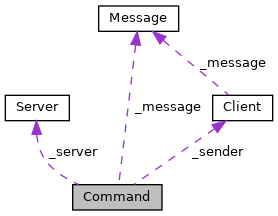#include <Command.hpp>
◆ Command()
◆ ~Command()
| virtual Command::~Command |
( |
| ) |
|
|
inlinevirtual |
◆ execute()
| virtual void Command::execute |
( |
| ) |
|
|
pure virtual |
Implemented in Mode, Join, PrivMsg, Kick, Part, Notice, Nick, Whois, Invite, Topic, Pass, User, Names, List, Help, Quit, and Ping.
◆ getDescription()
| std::string Command::getDescription |
( |
| ) |
const |
|
inline |
◆ getExample()
| std::map<size_t, std::string> Command::getExample |
( |
| ) |
const |
|
inline |
◆ getName()
| std::string Command::getName |
( |
| ) |
const |
|
inline |
◆ getSender()
| Client* Command::getSender |
( |
| ) |
const |
|
inline |
◆ getUsage()
| std::string Command::getUsage |
( |
| ) |
const |
|
inline |
◆ hasOpe()
| bool Command::hasOpe |
( |
void |
| ) |
|
|
inline |
◆ missingOpe()
| void Command::missingOpe |
( |
void |
| ) |
|
|
inline |
◆ needsAuth()
| bool Command::needsAuth |
( |
void |
| ) |
|
|
inline |
◆ parser()
◆ setMessage()
| void Command::setMessage |
( |
Message * |
message | ) |
|
|
inline |
◆ setSender()
| void Command::setSender |
( |
Client * |
sender | ) |
|
|
inline |
◆ setServer()
| void Command::setServer |
( |
Server * |
server | ) |
|
|
inline |
◆ validate()
| virtual bool Command::validate |
( |
void |
| ) |
|
|
inlinevirtual |
Reimplemented in Whois, Notice, Join, Kick, Pass, PrivMsg, User, Nick, Topic, Invite, Part, and Mode.
◆ _description
| std::string Command::_description |
|
protected |
◆ _example
| std::map<size_t, std::string> Command::_example |
|
protected |
◆ _is_ope
◆ _message
◆ _name
| std::string Command::_name |
|
protected |
◆ _needs_auth
| bool Command::_needs_auth |
|
protected |
◆ _sender
◆ _sender_index
| size_t Command::_sender_index |
|
protected |
◆ _server
◆ _usage
| std::string Command::_usage |
|
protected |
The documentation for this class was generated from the following file:




